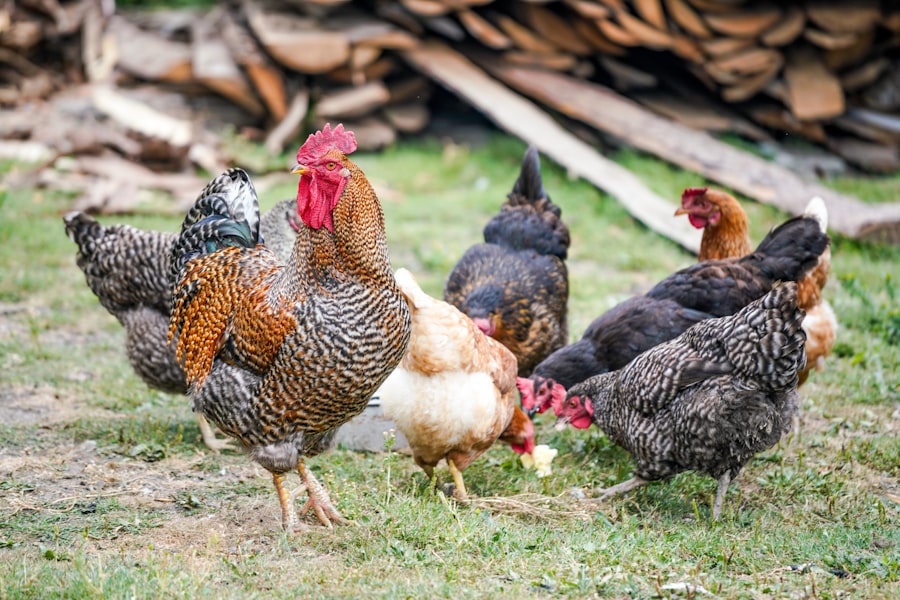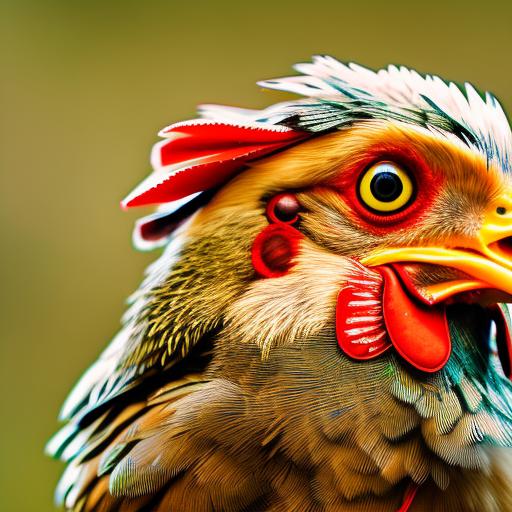Keeping chickens in urban areas, such as London, has become increasingly popular in recent years. Many people are drawn to the idea of having their own fresh eggs and a sustainable food source right in their own backyard. Not only does it provide a sense of self-sufficiency, but it also allows individuals to connect with nature and promote sustainability in their community.
Key Takeaways
- Keeping chickens in London is legal, but there are regulations to follow
- Choosing the right chicken coop is important for the safety and comfort of your chickens
- Keeping chickens can provide fresh eggs and a fun hobby for urban dwellers
- Proper feeding, watering, and cleaning are essential for the health of your chickens
- Predators and pests can pose a threat to your chickens, so it’s important to take precautions
Understanding the laws and regulations surrounding chicken keeping in London
Before embarking on the journey of keeping chickens in London, it is important to understand the laws and regulations surrounding this practice. In the UK, there are certain legal requirements that must be met in order to keep chickens. These include obtaining the necessary permits and licenses, ensuring that the chickens are properly housed and cared for, and following guidelines for biosecurity and disease prevention.
To obtain the necessary permits and licenses, individuals must contact their local council or authority to inquire about the specific requirements for keeping chickens in their area. This may involve filling out an application, paying a fee, and meeting certain criteria, such as having a suitable backyard space for the chickens.
Choosing the right chicken coop for your backyard
One of the most important considerations when keeping chickens in London is choosing the right chicken coop for your backyard. The coop should provide a safe and comfortable environment for the chickens, while also being practical and easy to maintain.
When selecting a chicken coop, there are several factors to consider. First, you will need to determine the size of the coop based on the number of chickens you plan to keep. It is recommended to allow at least 4 square feet of space per chicken inside the coop, and at least 10 square feet per chicken in an outdoor run.
There are different types of coops available, including traditional wooden coops, mobile coops (also known as chicken tractors), and DIY coops made from repurposed materials. Each type has its own pros and cons. Traditional wooden coops are sturdy and provide good insulation, but they can be more expensive and require regular maintenance. Mobile coops are convenient for those who want to move their chickens around the yard to graze on fresh grass, but they may not provide as much protection from predators. DIY coops can be cost-effective and customizable, but they require more time and effort to build.
The benefits of keeping chickens in London
There are numerous benefits to keeping chickens in London. First and foremost, having your own flock of chickens allows you to have a constant supply of fresh eggs. Not only are these eggs delicious and nutritious, but they also have a lower carbon footprint compared to store-bought eggs, as they do not need to be transported long distances.
Keeping chickens also promotes sustainability by reducing food waste. Chickens are excellent at recycling kitchen scraps and garden waste, turning them into nutrient-rich compost for your garden. They also help control pests, such as slugs and snails, which can be a nuisance in urban gardens.
Furthermore, chickens provide an opportunity for individuals to connect with nature and experience the joys of caring for animals. They can be entertaining and therapeutic to watch, and many people find that spending time with their chickens helps reduce stress and improve mental well-being.
Caring for your chickens: Feeding, watering, and cleaning
Proper care is essential for the health and well-being of your chickens. When it comes to feeding, it is important to provide a balanced diet that meets their nutritional needs. This typically includes a combination of commercial chicken feed, kitchen scraps, and fresh greens. It is important to avoid feeding them foods that are toxic or harmful to chickens, such as chocolate, onions, or avocado.
In addition to food, chickens also need access to clean water at all times. This can be provided through a water dispenser or a shallow dish that is refreshed daily. It is important to regularly clean and refill the water container to prevent the growth of bacteria.
Cleaning the chicken coop is another important aspect of chicken care. Regular cleaning helps prevent the buildup of waste and bacteria, which can lead to health issues for the chickens. The coop should be cleaned at least once a week, with soiled bedding and waste removed and replaced with fresh bedding. It is also important to regularly check for signs of pests or parasites and take appropriate measures to control them.
Protecting your chickens from predators and pests

Predators and pests can pose a threat to your chickens, especially in urban areas where there may be limited natural barriers. Common predators include foxes, rats, and birds of prey, while common pests include mites, lice, and worms.
To protect your chickens from predators, it is important to ensure that the coop is secure and predator-proof. This may involve using sturdy fencing, burying wire mesh around the perimeter of the coop to prevent digging, and installing locks on doors and windows. It is also important to provide a secure outdoor run for the chickens to roam during the day.
To prevent and control pests, regular cleaning and maintenance of the coop is essential. This includes regularly checking for signs of infestation, such as mites or lice, and taking appropriate measures to treat them. There are various natural remedies available for pest control, such as diatomaceous earth or herbal sprays.
Health concerns and diseases to watch out for in chickens
Chickens are susceptible to various health issues and diseases, so it is important to be vigilant and take appropriate measures to prevent and treat these issues. Common health concerns include respiratory infections, parasites, egg-laying problems, and injuries.
To prevent health issues, it is important to provide a clean and well-ventilated environment for your chickens. Regular cleaning of the coop and providing fresh bedding helps prevent the buildup of bacteria and parasites. It is also important to practice good biosecurity measures, such as washing your hands before and after handling the chickens, and not allowing visitors to enter the coop.
If you notice any signs of illness or injury in your chickens, it is important to seek veterinary advice as soon as possible. Early detection and treatment can help prevent the spread of disease and improve the chances of recovery.
Choosing the right breed of chicken for your backyard
When it comes to choosing the right breed of chicken for your backyard, there are several factors to consider. Different breeds have different characteristics, such as size, temperament, egg-laying ability, and cold-hardiness.
If you are primarily interested in egg production, there are breeds that are known for their high egg-laying capacity, such as the Rhode Island Red or the Sussex. If you have limited space and want a smaller breed, bantam chickens may be a good option. If you live in an area with cold winters, it is important to choose a breed that is cold-hardy, such as the Orpington or the Plymouth Rock.
It is also important to consider the temperament of the breed. Some breeds are more docile and friendly, while others may be more flighty or aggressive. If you have children or plan to interact with your chickens frequently, it is important to choose a breed that is known for its friendly disposition.
Tips for maintaining a healthy and happy flock
To maintain a healthy and happy flock of chickens, there are several tips to keep in mind. First and foremost, it is important to provide them with a clean and comfortable living environment. This includes regular cleaning of the coop, providing fresh bedding, and ensuring that they have access to clean water and nutritious food.
Chickens also benefit from enrichment activities and socialization. This can include providing them with toys or treats to peck at, allowing them to free-range in a safe and supervised area, and spending time with them to build trust and bond.
It is also important to prevent and manage conflicts within the flock. Chickens have a social hierarchy, and it is normal for them to establish a pecking order. However, if aggression becomes excessive or if one chicken is being consistently bullied, it may be necessary to separate them or provide additional space and resources.
The joys and challenges of keeping chickens in London
Keeping chickens in London can be a rewarding and fulfilling experience. It allows individuals to have their own fresh eggs, promote sustainability, and connect with nature. However, it also comes with its challenges, such as understanding the laws and regulations, providing proper care and maintenance, and protecting the chickens from predators and pests.
Despite the challenges, many people find that the benefits far outweigh the difficulties. The joy of collecting fresh eggs each day, watching the chickens roam and forage in the backyard, and knowing that you are contributing to a more sustainable food system are all rewards of keeping chickens in an urban environment.
So, if you have a backyard in London and are interested in exploring the world of chicken keeping, I encourage you to do your research, obtain the necessary permits, and embark on this rewarding journey. With proper care and attention, you can enjoy the many benefits of having your own flock of chickens right in your own backyard.
If you’re considering keeping chickens in London, you may be wondering how big your coop needs to be to provide a comfortable living space for your feathered friends. Luckily, Poultry Wizard has an informative article that answers this question. Their article titled “How Big Does a Coop Need to Be for a Chicken?” provides valuable insights and guidelines on the ideal coop size for chickens. Whether you have a small backyard or a larger space, this article will help you determine the appropriate coop dimensions to ensure your chickens’ well-being. For more information, check out Poultry Wizard’s article here.
FAQs
What are the rules and regulations for keeping chickens in London?
The rules and regulations for keeping chickens in London vary depending on the borough. Generally, you are allowed to keep chickens in your garden as long as you follow certain guidelines and obtain the necessary permits.
How many chickens can I keep in my garden?
The number of chickens you can keep in your garden depends on the size of your garden and the regulations of your borough. In general, most boroughs allow up to four chickens in a standard-sized garden.
Do I need a permit to keep chickens in London?
Yes, you need a permit to keep chickens in London. The permit is usually issued by your local council and is required to ensure that you are following the guidelines and regulations for keeping chickens in your area.
What are the guidelines for keeping chickens in London?
The guidelines for keeping chickens in London include providing adequate housing, food, and water for your chickens, keeping the area clean and free from pests, and ensuring that your chickens do not cause a nuisance to your neighbors.
Can I keep a rooster with my chickens in London?
No, you are not allowed to keep a rooster with your chickens in London. Roosters are not permitted in residential areas due to their loud crowing, which can disturb your neighbors.
What are the benefits of keeping chickens in London?
Keeping chickens in London can provide you with fresh eggs, help reduce food waste by composting food scraps, and provide a fun and educational experience for children. Chickens also help control pests in your garden and can be a source of fertilizer for your plants.
Meet Walter, the feathered-friend fanatic of Florida! Nestled in the sunshine state, Walter struts through life with his feathered companions, clucking his way to happiness. With a coop that’s fancier than a five-star hotel, he’s the Don Juan of the chicken world. When he’s not teaching his hens to do the cha-cha, you’ll find him in a heated debate with his prized rooster, Sir Clucks-a-Lot. Walter’s poultry passion is no yolk; he’s the sunny-side-up guy you never knew you needed in your flock of friends!







